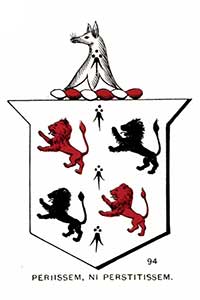The Donegan Family

(Crest No. 94. Plate 36.)
THE Donegan or Dongan family is descended from Milesius, King of Spain, through the line of his son Heremon. The founder of the family was Conchorb, of the Clanna Failge tribe. The ancient name of this family was Donoghad, signifying “Destroying,” and the title of the chief was Prince of Ara, in the present County of Tipperary.
The O’Donegans were, according to some authorities, of Ulster origin; and according to the Annals of Innisfallen were Princes of Muscraide Thiri, now Lower Ormond, in Tipperary. There were branches of this family also in Cork and Limerick. The latter were chiefs of Muscry of the Three Plains, now the half barony of Orrery, in the County of Cork.
The Donegans or Dongans, as the name is more generally written, were distinguished for their large and rich estates, and the high positions that many members of the family held. During the Cromwellian wars the Donegans adhered steadfastly to the cause of the Stuarts, and after the execution of Charles the First they were deprived of their estates, and the heads of the sept sought shelter in France. After the restoration of King Charles the Second they recovered their estates, and King James the Second, in recognition of the services of the family, raised its head, William Dongan, to the rank of Viscount Dongan of Claine, in the County of Kildare, and Earl of Limerick. He was appointed a member of the Royal Privy Council for Ireland, and Governor of the Province of Munster, and sat in the House of Lords in King James’ Parliament in Dublin. Refusing to acknowledge the Williamite Government, the Earl followed King James to France, thus forfeiting his splendid estates of more than twenty-six thousand acres in the Counties of Kildare, Dublin, Carlow, Meath, Kilkenny, Longford, Tipperary and Queens County. These lands were given by William to the Dutch General de Ginkel, who was created Earl of Athlone.
His son, Lord Walter Dongan, was commander of the regiment of dragoons bearing his name, one of the best cavalry regiments in James’ army. Lord Walter Dongan, after much brilliant and successful service, was killed by a cannon ball at the battle of the Boyne. His uncle, Colonel Thomas Dongan, succeeded to the title of Earl of Limerick. He had served as Colonel of an Irish regiment under Louis the Fourteenth of France, and had been for a time Lieutenant-Governor of Tangier, Morocco. He was subsequently appointed Governor of New York, and gave the State its first charter. He was the only Catholic Governor that New York has ever had, and one of his first acts, on the meeting of the first popular assembly, Oct. 17, 1683, was to have religious liberty declared, and freedom of conscience recognized in the State. It was owing to the action of Governor Dongan, also, that Long Island and Staten Island were incorporated in New York State, Connecticut having claimed the former, and New Jersey the latter.
